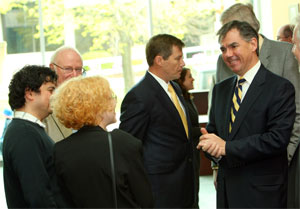 |
| Federal Industry Minister Jim Prentice talks with Kimberley Hall, assistant professor in the Department of Physics and Atmospheric Science, before the news conference gets underway. ┬а(Nick Pearce Photo) |
Trying to explain quantum mechanics to an audience of journalists, administrators and politicians isnтАЩt always easy, but Kimberley Hall and Jordan Kyriakidis have a knack for communicating its implications.
тАЬThe leap from modern computing to quantum computing is like that of the abacus to the computer itself,тАЭ said Dr. Hall, Canada Research Chair in Ultrafast Science at Dalhousie. She says the ability to process exponentially more computations at once makes quantum computing the wave of the future.
Federal Industry Minister Jim Prentice was on hand for the news conference in the Rowe Management Building on Friday, May 16┬аto┬аannounce an agreement between the university and Lockheed Martin Corporation valued at $2 million.
"This investment is further proof that our Canada First defence procurements are generating significant benefits for our industries and scientific community," said┬аMr. Prentice. "It's about new money being injected into the economy, new jobs being created, and new resources being allocated for scientific research and development."
The money will support the two physicistsтАЩ quest into this new scientific frontier, research with broad implications in fields such as encryption, data processing, defence and business technologies. Dr. Kyriakidis and Dr. Hall, both professors in the Department of Physics and Atmospheric Science, bring complementary skill sets to the task, balancing the theoretical foundation of the work with practical testing and application.
тАЬ║┌┴╧│╘╣╧═Їis pleased to be a member of the Aerospace and Defence Industries Association of Nova Scotia,тАЭ said Ronald Layden, executive director of Industry Liaison and Innovation for the university. тАЬWe welcome the opportunity to attract research attention from Lockheed Martin, one of the worldтАЩs top aerospace companies, to the region.тАЭ
Not everyone was so welcoming тАУ a small handful of protesters were in attendance, one of whom stood to the side of the room while the announcement ceremony took place. ║┌┴╧│╘╣╧═ЇPresident Tom Traves, in answering a question from the audience, stated the university welcomes open debate on its operations and agreements.
The funding is part of Lockheed Martin's commitment to place work in Atlantic Canada as a result of the federal government's purchase of 17 Super Hercules aircraft from the company.
Based in Bethesda, Md., Lockheed Martin has 140,000 employees worldwide, including 500 in Canada.
